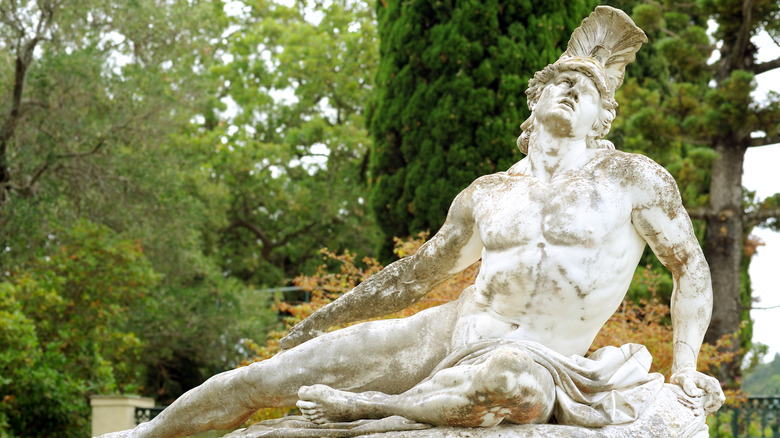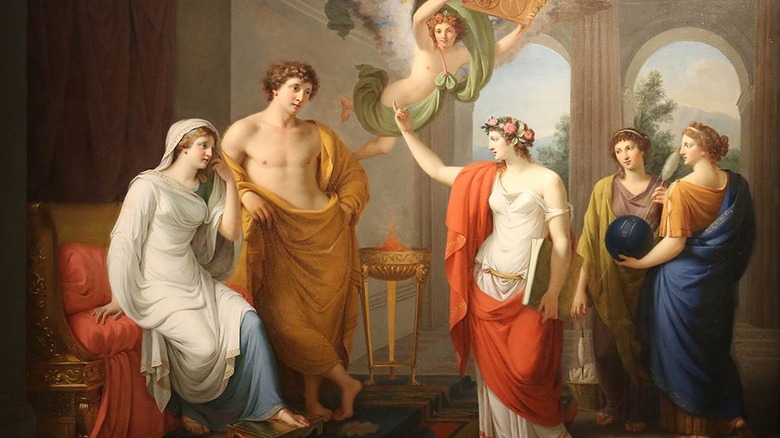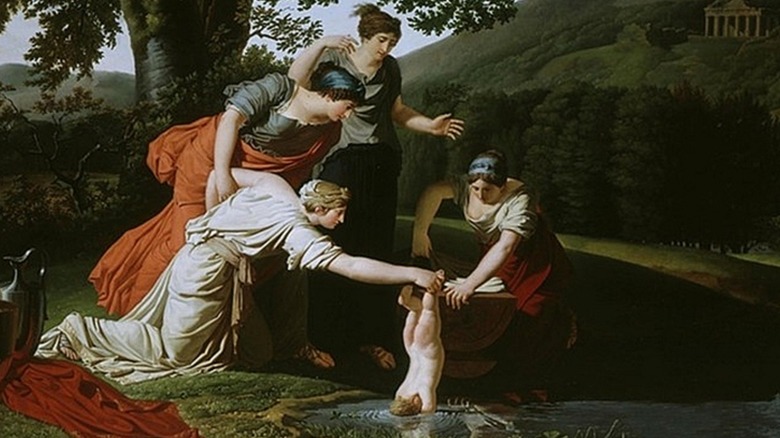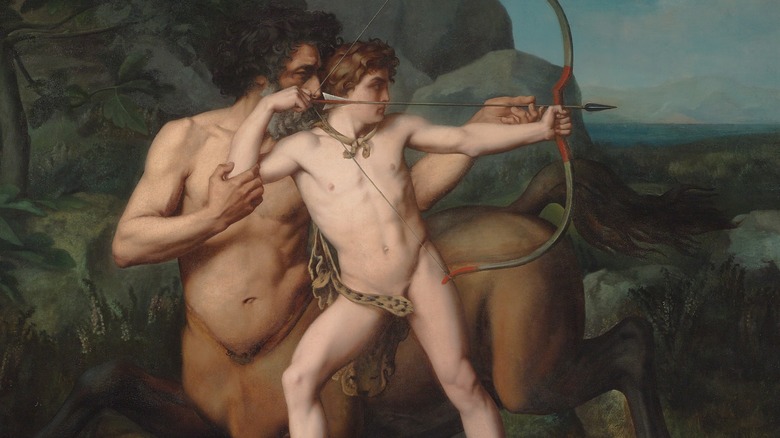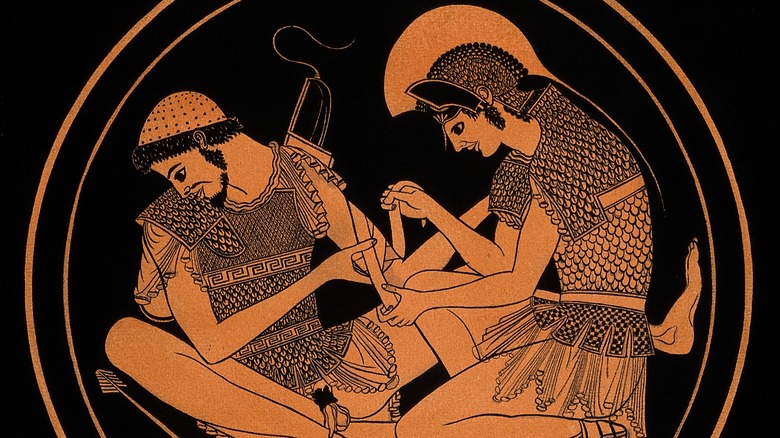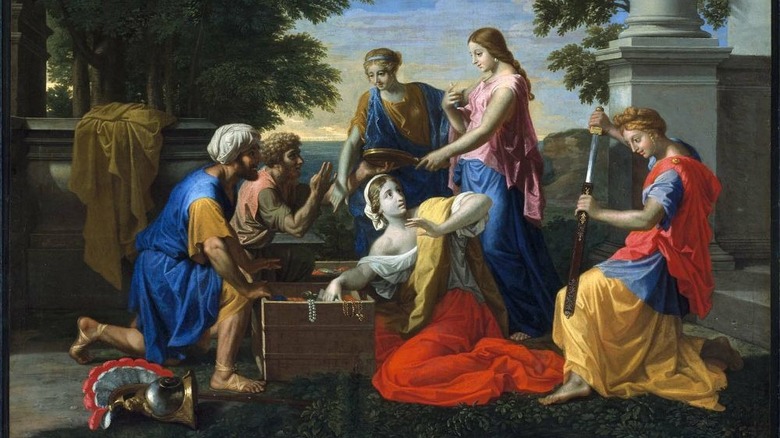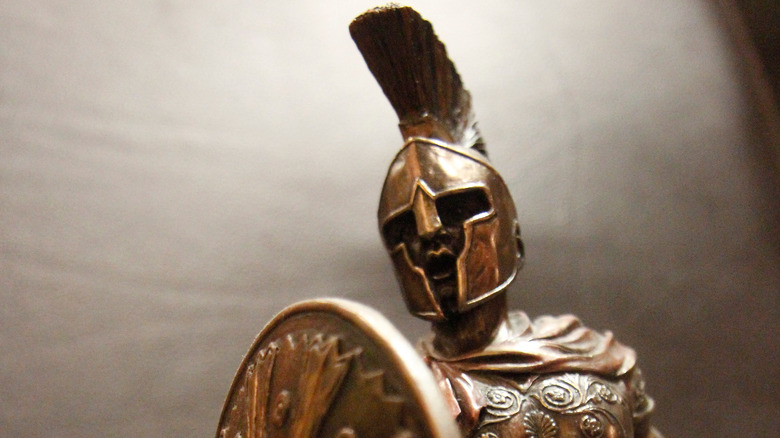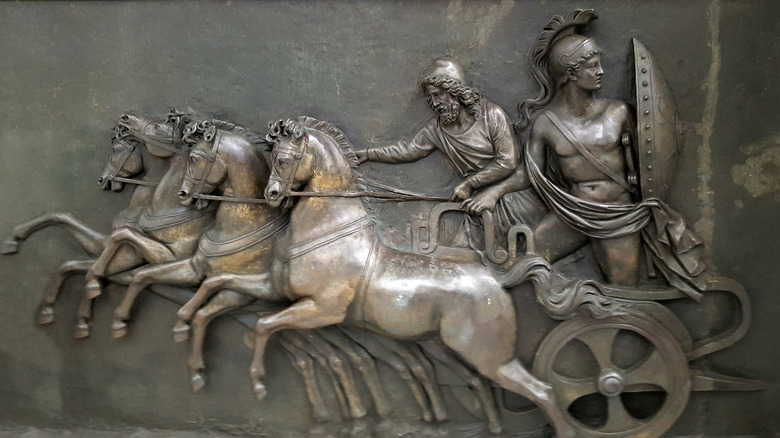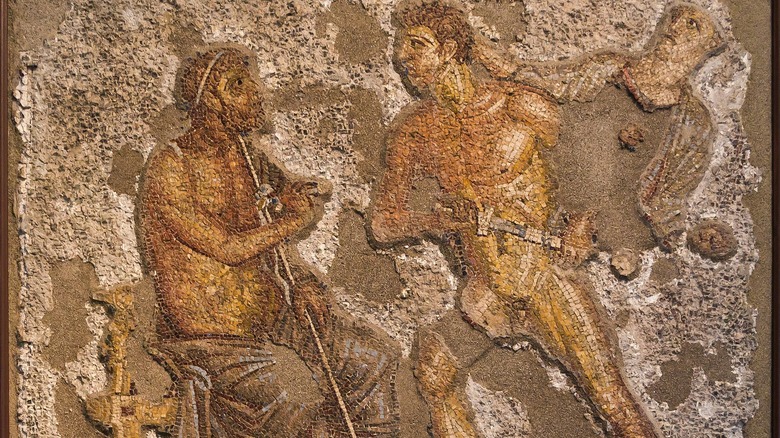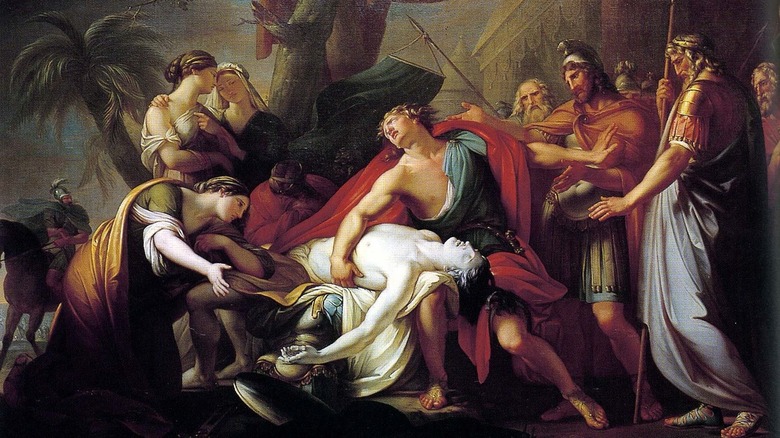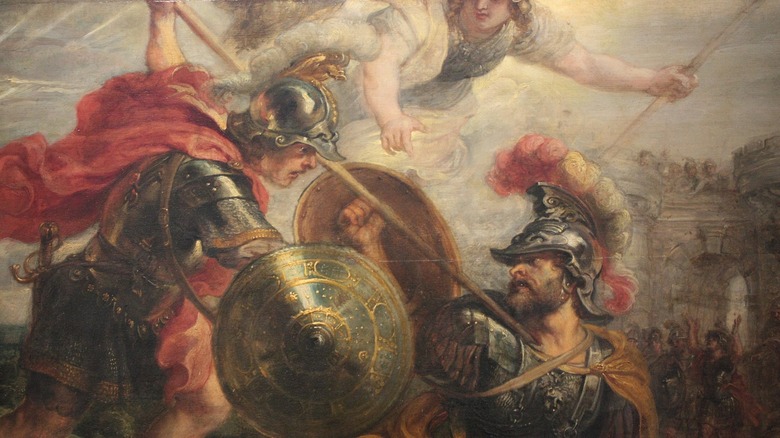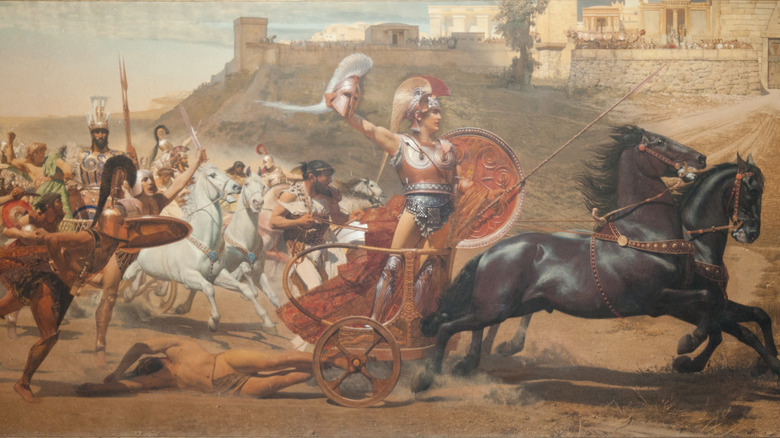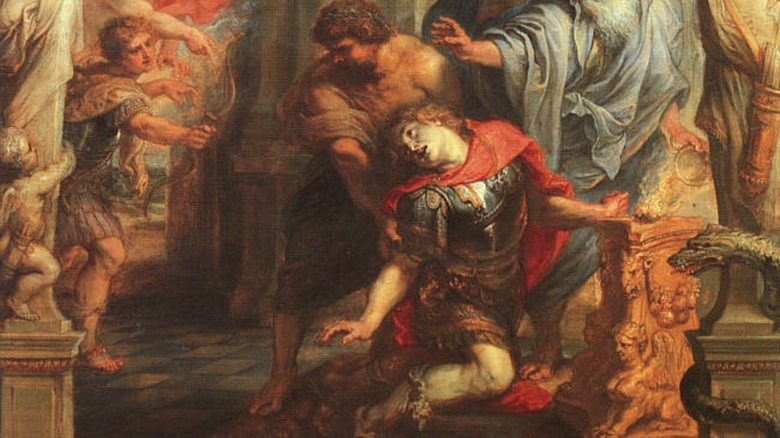The Mythology Of Achilles Explained
Achilles is one of those figures in Greek mythology that most people recognize but few know much about, other than the phrase "Achilles' heel." In antiquity, Achilles was a central hero in the Greek tradition — right up there with Hercules (or Herakles). But while Hercules is more widely understood, possibly through a solid foundation of Disney and television media, Achilles is not.
So why is there no animated film of a singing and dancing Achilles?
The mythology around Achilles is dark. Achilles' story is at minimum rated R for severe violence and messed up stuff. In fact, the only movie in recent years featuring Achilles, 2004's "Troy," staring Brad Pitt as Achilles was indeed rated R.
The fact is that Achilles wouldn't play well with the modern conception of a hero. For example, as you shall read, in "The Iliad," Achilles actually slays the most sympathetic character of that epic poem. What you shall also learn is that the ancient Greek conception of a hero was way different than what we expect today.
Achilles is half-human
There are two main stories regarding the origin of Achilles, both of which involve the chief Greek god Zeus. The first story, as explained by the British Museum, tells how both Zeus and his brother Poseidon had fallen in love with Thetis. Thetis was a Nereid, which according to Britannica, is usually defined as a sea nymph.
What could wrong with having the two most powerful deities in the universe interested in getting with you? Plenty. Themis, the goddess of Justice, made a prophecy that if one of the two gods had a child with Thetis, that child would be more powerful than their father.
Both Zeus and Poseidon had personal experience with this sort of thing. Zeus killed and overthrew his father, Cronus, for eating his brothers and sisters. Zeus managed to get his father to upchuck Poseidon and the others. Since patricide was a real concern, Zeus and Poseidon arranged to marry Thetis off to the mortal Peleus.
The other, less dramatic, version of the story is that Thetis brushed off Zeus's godly moves. As a result, Zeus declared that Thetis would never marry a god. Thus, she ended up with Peleus.
Peleus was honored by the arrangement, since it isn't often a mortal man has an opportunity to marry a divine being. But Thetis wasn't that happy with the arrangement. She ran away, but with the help of his friend Chiron the Centaur, Peleus managed to capture her.
Achilles was dipped into the river of death to make him invulnerable
Thetis was humiliated at being forced to marry Peleus. There was no way any child of hers was going to be just a Joe-schmo mortal. As described in "Achilles in Fire," Thetis gave birth to six children before Achilles. She decided to test them to see if any of the six were immortal, either by putting them in fire or boiling them in a cauldron. Neither method revealed any immortal children, so Achilles ended up becoming an only child. In fact, when Thetis decided to try holding Achilles over a divine fire by the heel, Peleus stepped in to prevent it.
A more well-known version of Achilles' youth is related by the World History Encyclopedia. Thetis, still with the same motivation to make her son immortal, dipped him into the River Styx by the heel. Now the River Styx was one of the rivers of the Underworld. Its representation of death reflected the powers that were imbued into the infant.
While both stories have similarities, "Achilles' Heel" maintains that there is a big difference between testing your children and being indifferent at their deaths versus trying to change their nature by dipping them in a river of death. Interestingly, the River Styx story may have been unknown to the ancient Greeks since the first record of it only occurs in Roman times.
Achilles was raised by a centaur
Thetis obviously was not an ideal parent, and this made Achilles' childhood dysfunctional at best. As noted by "The Education of Achilles," there is a myth that Thetis abandoned Peleus, leaving him alone with their son. Another myth tells that Thetis remained with the family and even packed Achilles' chest when he headed off to the Trojan War. Either way, most of the traditions agree that at some point as a child, Peleus handed Achilles over to Chiron the Centaur to be educated.
According to "Chiron the Centaur," half-man, half-horse centaurs were considered to be wild and lawless creatures who lived in drunken debauchery. Chiron, however, was the exception and was considered wise and righteous. So what did Chiron teach Achilles? Some myth traditions hold that Chiron fed Achilles a diet of boar and lion entrails, as well as the marrow of bear bones, to impart the strength of those beasts into him. Contrasting this are other myths that state that the hero was given a gentler diet of deer marrow and honey comb. Either diet seems rather paleo.
Chiron also taught Achilles healing and how to play the lyre. He also taught the young god how to hunt and how to wage war. In fact, the spear that Achilles famously used at Troy was Chiron's spear.
Achilles' BFF was Patroclus
A seminal part of Achilles' youth was developing a close bond with Patroclus, who would become his lifelong companion. Patroclus joined Achilles' household as an exile after having accidently killed another child. The two became lifelong friends, the closest of companions. In fact, the death of Patroclus in "The Iliad" is a key plot point that brings Achilles back into the fight against the Trojans.
Many have speculated that Achilles and Patroclus were lovers. This includes, according to "Achilles and Patroclus in Love" even ancient writers. Ancient World Magazine asserts that the close relationship might be similar to that of comrades-in-arms who go through intense combat experiences. While Homer never explicitly states that there was a physical relationship between the duo they were obviously intimate. "The Iliad" quotes Achilles as saying upon Patroclus' death, "All those burning desires Olympian Zeus has brought to pass for me — but what joy to me now? My dear comrade's dead — Patroclus — the man I loved beyond all other comrades, loved as my own life — I've lost him."
Achilles tried to get out of the Trojan War by going into hiding as a girl
So between being dipped in death rivers and undergoing centaur boot camp, Achilles became a killing machine. He had become a hero, which according to the Harvard University Press, was defined differently than it is today. A hero to the ancient Greeks was a person who was endowed with superhuman abilities because he or she was descended from the gods. A hero did not have to have any moral virtue, in fact, many, such as Achilles, had superhuman faults.
Achilles shows off most of his hero-cred in the Trojan War. This mythological war started when Helen, the wife of King Menalaeus of Sparta flitted off with Paris of Troy. Menaleus assembled a coalition of Greeks (called Achaeans) to get her back, which was led overall by his brother, King Agamemnon. As explained by the British Museum, since Achilles was so skillful and powerful, it was prophesied that the Greeks could only win the war with his help. However, another prophecy foretold that Achilles would die in the war.
This second prophecy, troubled Peleus and Thetis (who somehow came back into the picture). According to "Achilles at Skyros," his parents hid Achilles on the island of Skyros, dressed as a girl in the court of King Lykomedes. However, as described by "The Ancient Art of Emulation," the Greeks dispatched the wily Odysseus to get him. In order to determine who Achilles was, Odysseus presented gifts to the ladies at court that included jewelry, mirrors, and a sword and shield. When Achilles immediately went for the sword and shield, his disguise was uncovered and the hero was enlisted into the war.
Achilles led the Myrmidons
In a very odd jump in logic, Achilles went from hiding to becoming a war leader. As recounted by the British Museum, Achilles arrived in Troy with 50 ships and elite warriors called the Myrmidons. As described by "Warrior Ants" the Myrmidons were infantry, who along with the troops commanded by Ajax, comprised the best warriors the Greeks had. Analysis has shown that these infantry troops, unlike other soldiers, were able to handle enemy chariots and show individual prowess. It seems, however, that any of the ancient Greeks who fought at Troy were by Homer's depiction not capable of maintaining order. There were instances of the Myrmidons marching to war in "The Iliad," such as after Achilles gave an stirring speech:
"So saying, he aroused the strength and spirit of every man, and yet closer were their ranks serried when they heard their king. And as when a man buildeth the wall of a high house with close-set stones, to avoid the might of the winds, even so close were arrayed their helms and bossed shields; buckler pressed on buckler, helm upon helm, and man on man. The horse-hair crests on the bright helmet-ridges touched each other, as the men moved their heads, in such close array stood they one by another."
However, when it came to battle, they broke order and the fight became completely disordered as each individual sought their own glory. Only rarely do the Myrmidons, or any of the ancient Greek forces, show any sort of tactical sense in mythology.
Achilles was the Greek Weapon X
Now where Achilles really shone was in his own ability in single combat. He was the Greek superweapon. However, this superweapon was largely kept at bay for the first nine years of the Trojan War.
"Wily Achilles" gives some sense of Achilles accomplishments. He and the Myrmidons sacked 12 cities by sea and 11 by land. Unfortunately, not much is known about the early years of the war. However, it was in these raids that Achilles had captured the women Briseis and Chryseis (sometimes Chryses). As explained in "The Iliad," Achilles gave to Agamemnon, Chryseis, but Chryseis' father offered a ransom for her. Initially Agamemnon refused, but after divine action by Apollo which caused a plague, he gave her up. Instead he seized Briseis.
"The Iliad" is unclear on whether Achilles actually loved Briseis or not. In some sections of the epic poem he declares his love for her, and then later he makes statements dismissive of her. Either way, Achilles was insulted by Agamemnon's action, seeing the taking of Briseis overreaching arrogance. It is with this conflict of wills that we learn the most about Achilles and just how unpleasant he was.
Achilles was very sulky
"The Iliad" describes how Achilles, angry at Agamemnon, refused to fight. Without the Achaean's superweapon in the lineup, the Trojans led by Prince Hector make gains against the Greeks. With things looking very grim, Agamemnon comes and begs Achilles to rejoin the fight offering Briseis and treasure. However, the sulky hero refuses even after Odysseus tries to guilt him into it by describing how many Greeks will die if he doesn't join the fight. Odysseus' prediction proves to be true.
As noted by the World History Encyclopedia, Hector and the Trojans drove the Greeks back and even set some of the Greek ships ablaze. Finally, Patroclus begged Achilles to allow him to lead the Myrmidons into battle, even if Achilles himself won't go. Achilles agrees and lets Patroclus wear his armor to lead a defensive action against the Trojans. Patroclus is very successful at first, but then he becomes overconfident and leads a rash charge. Then after intervention by Apollo, he is struck by a spear. The wounded Patroclus is then finished off by Hector's spear. Hector then seizes Achilles' armor and wears it.
Things were looking pretty good for Hector, but soon enough, Achilles would find out that his BFF was killed.
The rage of Achilles
Robert Fagles' translation of "The Iliad" opens powerfully with: "Rage — Goddess, sing the rage of Peleus' son Achilles, murderous, doomed, that cost the Achaeans countless losses..." First there is the rage at Agamemnon, but even more so it alludes to the rage that overcomes Achilles when he learns that Patroclus is dead. As discussed in Ancient World Magazine, only blood will console Achilles.
First, he vows vengeance to his mother, who appears to him at this hour. Thetis then arranges to have the divine craftsman, Hephaistos, create a new set of armor for her son. This armor, as described in "The Armour of Achilles" was gold and could not be pierced by arrows. Think of it like how Tony Stark upgraded his Iron Man suit. When Achilles is ready, he has a big reconciliation feast with Agamemnon. However, Achilles is more interested in killing Hector to avenge Patroclus' death.
With that general goal, Achilles leads his Myrmidons on a killing spree, driving the Trojans back into the city. At one point, so many Trojans stain the River Xanthos with blood, that the river god rises in protest to chase Achilles off.
So, yeah... Achilles was pretty angry.
Achilles vs. Hector
Eventually, Achilles corners Hector before the gates of Troy. The city is watching, including Hector's father, King Priam. Now Hector himself is a heroic warrior so you would expect the most epic duel in all of mythology. Right?
Guess again. Achilles fighting Hector would be the equivalent of the 1927 Yankees squaring off against the Bad News Bears. As told in "The Iliad," when Hector sees the centaur-trained death machine heading his way, he throws his spear, which promptly rebounds off of Achilles upgraded armor. Hector looks around, sees he is alone and then runs for it sort of like Scooby and Shaggy. The chase loops around the city three times before Achilles thrusts his spear into Hector's throat, taking his revenge.
Did Achilles feel at all guilty about killing Troy's most noble warrior? No. He informed the dying Hector of this while he was about to become carrion. Hector begged at Achilles' knees and by his parents to return his body back to Troy. Achilles response: "Dog, talk not to me neither of knees nor parents; would that I could be as sure of being able to cut your flesh into pieces and eat it raw, for the ill have done me, as I am that nothing shall save you from the dogs. "
Achilles was a sore winner
According to "The Iliad," in Hector's last words to Achilles, Hector prophesied the hero's death at the hands of Apollo and Paris. Achilles hardly seemed to care. Instead, he took Hector's body and dragged it behind his chariot before the gates of Troy. He then took the body and returned to the Greek encampment. As described by the World History Encyclopedia, Achilles held funeral games for Patroclus, which included chariot races.
It was hardly a fun time though. The gods were furious with Achilles for his desecration of Hector's body. Hector's father, Priam, with the help of the messenger god Hermes, arrived in the Greek camp. Priam begged Achilles to give back the body in a speech that in part said:
"Think of your father, O Achilles like unto the gods, who is such even as I am, on the sad threshold of old age. It may be that those who dwell near him harass him, and there is none to keep war and ruin from him. Yet when he hears of you being still alive, he is glad, and his days are full of hope that he shall see his dear son come home to him from Troy; but I, wretched man that I am, had the bravest in all Troy for my sons, and there is not one of them left."
This moved Achilles to relent and return the body to Priam. "The Iliad" ends there, however, the story of Achilles continues on for a short while more.
Achilles' death
The myth of Achilles ends with his fated death. The World History Encyclopedia explains that the hero continued to dominate the stage in the final days of the war. For example, according to the British Museum, he slew the King of the Ethiopians and the Queen of the Amazons. Ironically, as Achilles was slaying the Amazon queen he fell in love with her, but it was too late.
Finally, as the Greeks pushed to the city, Hector's brother Paris (and the one who started the war by abducting Helen) shot an arrow that was guided by Apollo and struck Achilles' vulnerable heel. There has been some speculation as to how a wound to the heel could cause death since it is a non-vital area even among mortals. "Achilles' Heel" in its analysis looks at various metaphysical reasons, the possible use of poison arrows, or that Paris' arrow to the heel immobilized Achilles long enough for a final blow to be struck in a more vital area. It seems strange to apply plausibility tests to myths, but scholars certainly seem to love doing it.
After the events of "The Iliad," Achilles made one last appearance as a ghost in Homer's "Odyssey," where he lamented his own death. Because of his central role in this seminal work of Homer, Achilles' mythology was one of the most popular subjects of antiquity. Ultimately, Achilles' story, which centers on the themes of fate, raw emotion, and deep flaws in character can still resonate with readers today.
